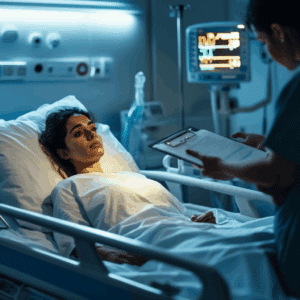Key Takeaways
- Immediate medical attention is crucial for severe symptoms post-accident, such as loss of consciousness, severe pain, and visible injuries, as they may indicate serious, hidden injuries.
- Pain, neurological symptoms, and psychological issues may develop or worsen after a car accident, necessitating ongoing monitoring and medical evaluation to prevent long-term complications.
- Timely diagnosis and consultation with medical professionals are essential to address potential injuries effectively and to secure appropriate compensation for treatment and recovery.
Let's Go Beyond, to Bring You Back
Let's get you the compensation you're entitled to. Get a FREE Consultation today.
Let's Go Beyond, to Bring You Back
You deserve the compensation you’re entitled to, call for your FREE Case Review today.
Immediate Signs of Serious Injury
Certain symptoms right after a car accident require urgent medical attention, including post-car accident symptoms and symptoms after a car accident. Here are some critical indicators that you need to seek help right away:
- Severe pain
- Loss of consciousness
- Visible injuries
- Chest pain
- Difficulty breathing
These symptoms might indicate severe internal injuries like rib fractures or punctured lungs, requiring immediate medical evaluation.
Nausea and vomiting should not be ignored either, as they can signal severe underlying issues such as a traumatic brain injury. Even without immediate pain, a medical check-up is important because some injuries may not appear right away but can worsen over time.
Severe Pain or Discomfort

Neck pain, for instance, is a common symptom of neck injuries and neck fractures, which can result from the sudden impact during a crash. If left untreated, neck fractures can lead to paralysis or even death.
Post-accident dizziness might indicate a concussion or inner ear damage, requiring medical evaluation. Symptoms indicating spinal cord damage, such as pain or tenderness at the injury site, loss of movement, and bowel or bladder dysfunction, should not be overlooked.
These symptoms are clear warning signs that immediate medical attention is necessary to prevent long-term complications.
Loss of Consciousness
A brief loss of consciousness post-accident may indicate serious head trauma or a concussion. Such an event is a red flag for traumatic brain injuries and necessitates immediate medical evaluation. Ignoring loss of consciousness can result in untreated brain injuries with severe, lasting consequences.
Visible Injuries
Scars, bruises, broken bones, and eye damage are visible injuries that can occur in a car accident. It’s crucial to seek help for visible injuries like deep cuts, lacerations, and significant bleeding to control these issues effectively. Bruises and deep cuts often require immediate medical attention to prevent complications like infection.
Treating visible injuries promptly can prevent complications and ensure a smoother recovery.
Neurological Symptoms to Monitor
Post-accident neurological symptoms may signal serious conditions like traumatic brain injuries. Watch for signs like loss of consciousness, confusion, and memory loss. Cognitive changes like confusion or memory loss should lead to a medical evaluation, as they may indicate head injuries and accident symptoms.
Dizziness, blurred vision, and severe headaches also need further evaluation for underlying issues. Monitoring delayed symptoms like persistent headaches or difficulty balancing is crucial, as they may indicate serious injuries.
Headaches and Dizziness
Post-accident headaches can result from tension, whiplash, or concussion. Persistent headaches may signal a severe injury and should not be ignored. Worsening headaches after a car accident necessitate medical attention.
Persistent dizziness may stem from inner ear or brain issues and requires assessment.
Numbness or Tingling
Numbness, pain, or tingling in the hands, back, neck, and extremities might indicate nerve or tissue damage post-accident. Tingling or numbness in the extremities may point to pinched nerves, nerve pressure, or spinal injury. If you notice numbness, assessing these symptoms is crucial to identify nerve pressure and develop an appropriate medical plan.
Damaged spinal discs could be the underlying cause, necessitating a medical evaluation.
Confusion or Memory Problems
Confusion and memory issues may indicate brain trauma post-accident. Confusion symptoms include memory loss and disorientation. Confusion or memory loss could signal serious injuries like a concussion or brain injury, which need medical attention.
Emotional changes, like increased irritability, may also signal underlying brain trauma.
Houston Car Accident Lawyer
Get Compensated For Your Injuries & Damages! Call Us For A FREE Case Review And Know What Your Case Is Worth.
Musculoskeletal Pain and Discomfort
Musculoskeletal injuries are common after car accidents and can include sprains, tendonitis, soft tissue injuries, and herniated discs. Symptoms like numbness or tingling may arise due to damaged spinal discs or ligaments. Swelling often accompanies injury symptoms like pain and stiffness and requires medical evaluation to avoid long-term complications, including soft tissue damage.
Persistent discomfort could signify severe underlying injuries, such as internal bleeding or fractures. Immediate medical evaluation is crucial after a whiplash injury to prevent long-term issues.
Neck and Shoulder Pain
After a car accident, neck pain is a common symptom. Shoulder pain often accompanies it as well. Whiplash injuries can lead to neck pain, headaches, and decreased range of motion. Early intervention plays a crucial role in minimizing pain. It also helps in preventing the development of chronic conditions. Consulting a medical professional is essential if experiencing neck pain after an accident.
Treatment for muscle spasms and strains may include rest, heat, and ice therapy.
Back Pain
Back pain can result from injuries to the muscles, discs, or ligaments and may require physical therapy. Symptoms of lumbar or thoracic vertebrae fractures can range from mild to severe pain.
Surgery is often the recommended treatment for a herniated or slipped disc after a car accident.
Abdominal Pain or Swelling
Abdominal pain or swelling following a car accident can signal internal injuries such as internal bleeding. Abdominal injuries often require immediate medical evaluation to rule out serious conditions like organ damage. If you notice bruising, tenderness, or discoloration that doesn’t improve, it’s important to take action. Seeking medical care is essential in such situations.
Persistent lower abdominal pain should be communicated to a doctor for further tests.
Psychological and Emotional Warning Signs
Anxiety or shock is common after a car accident. These feelings can significantly affect an individual’s emotional well-being. Recognizing and addressing emotional responses is crucial for quality of life. Mental health assistance is as vital as treatment for physical injuries.
Sleep disturbances such as insomnia or frequent waking can be significant indicators of underlying trauma. Mental health counseling services are available to help manage anxiety or depression post-accident.
Emotional Distress and Mood Swings
Emotional distress post-accident can manifest as:
- Anxiety, which may include symptoms like excessive worry, restlessness, and irritability
- Depression
- Mood swings, which can affect relationships and overall enjoyment of life
These symptoms can significantly impact daily life.
Professional help is crucial for addressing these symptoms and preventing long-term medical intervention for mental health issues.
Difficulty Sleeping and Nightmares
PTSD sufferers may have memories and dreams about the car crash, causing disturbed sleep and nightmares. A traumatic event can lead to post-traumatic stress disorder after a serious car accident, affecting mental and emotional well-being. Additionally, post-traumatic stress can exacerbate these symptoms.
These symptoms can impact daily functioning and decision-making, necessitating professional counseling. Consult a mental health professional for sleep disturbances or vivid nightmares.
Concentration and Memory Issues
Difficulty focusing and retaining information may signal the need for psychological assessment. Trauma can cause difficulty remembering details or focusing, hindering daily activities. Post-accident focus and memory issues may indicate anxiety or other mental health challenges.
Delayed Symptoms to Be Aware Of
Car accidents can cause visible and hidden injuries that might not show symptoms immediately, requiring prompt medical evaluation. Symptoms like headaches, body aches, bruises, and pain should be monitored. Delaying treatment can result in experiencing chronic pain and shooting pain, leading to long-term issues. Early medical evaluation helps rule out serious injuries and prevent chronic pain.
Persistent Headaches and Migraines
Concussion symptoms usually resolve within days or weeks, but persistent headaches might indicate post-concussion syndrome. Persistent headaches might signal underlying injuries beyond mere irritation. These ongoing headaches are often symptomatic of concussions or other serious conditions that need medical evaluation.
Seek medical attention for persistent headaches to prevent further complications.
Swelling and Stiffness
Swelling and stiffness in joints or muscles may develop hours or days post-accident. Swelling from joint injuries may not appear until days after the accident. Initial treatments for swelling involve elevating the affected areas and applying ice.
Persistent swelling needs medical evaluation to avoid long-term complications.
Blurred Vision and Tinnitus
Tinnitus post-accident might indicate serious issues like a concussion. Blurred vision and tinnitus may signal head or ear injuries. Do not ignore visual disturbances, as they may indicate injuries needing medical evaluation.
If you have blurred vision or tinnitus, seek medical attention promptly for assessment.
When to Seek Medical Attention
Suspect a serious injury after a car accident? Seek medical attention immediately. A splitting headache upon waking requires immediate medical attention. Abdominal pain or swelling could indicate severe health issues, so seek help. Dizziness and blurred vision should prompt an immediate medical visit.
Recognizing injury signs is vital for safeguarding your health and well-being. Immediate treatment can prevent short- and long-term effects of untreated injuries.
Importance of Early Diagnosis
Timely diagnosis prevents chronic pain and complications, making immediate medical evaluation essential. Delaying treatment can worsen injuries, prolong recovery, and increase the risk of chronic conditions. Unsure about your injuries post-accident? Seek medical attention immediately.
A thorough medical evaluation ensures proper documentation and medical treatment of sustained injuries.
Consulting with Medical Professionals
It is important to consult an experienced physician after an auto accident to evaluate potential injuries from a motor vehicle accident. Consulting a medical professional addresses new or worsening symptoms promptly, ensuring proper treatment.
Legal Advice for Medical Claims
Legal counsel post-accident helps navigate medical claims and compensation complexities. Wyly & Cook can help manage medical bills and ensure appropriate injury compensation.
Understanding the compensation claims process is vital for securing financial recovery post-accident.
Frequently Asked Questions
What are the most critical immediate symptoms to watch for after a car accident?
The most critical immediate symptoms to watch for after a car accident include severe pain, loss of consciousness, visible injuries, chest pain, and difficulty breathing; these require urgent medical attention. Prompt action can be vital for recovery.
Why is it important to monitor neurological symptoms after a car accident?
Monitoring neurological symptoms after a car accident is crucial because they may signify serious conditions, such as traumatic brain injuries, that require prompt medical attention. Early detection can significantly impact recovery and outcomes.
How can psychological symptoms manifest after a car accident?
Psychological symptoms after a car accident can manifest as anxiety, depression, mood swings, difficulty sleeping, and nightmares, all of which may severely affect daily life and necessitate professional mental health support.
Why is early diagnosis crucial after a car accident?
Early diagnosis after a car accident is crucial as it prevents chronic pain and complications while ensuring proper treatment and documentation of injuries. This proactive approach can significantly shorten recovery periods.
When should I seek legal advice after a car accident?
You should seek legal advice after a car accident if you have sustained injuries or are facing difficulties with medical claims and compensation. Engaging with a knowledgeable personal injury attorney can help ensure you receive the appropriate support and guidance throughout the process.



